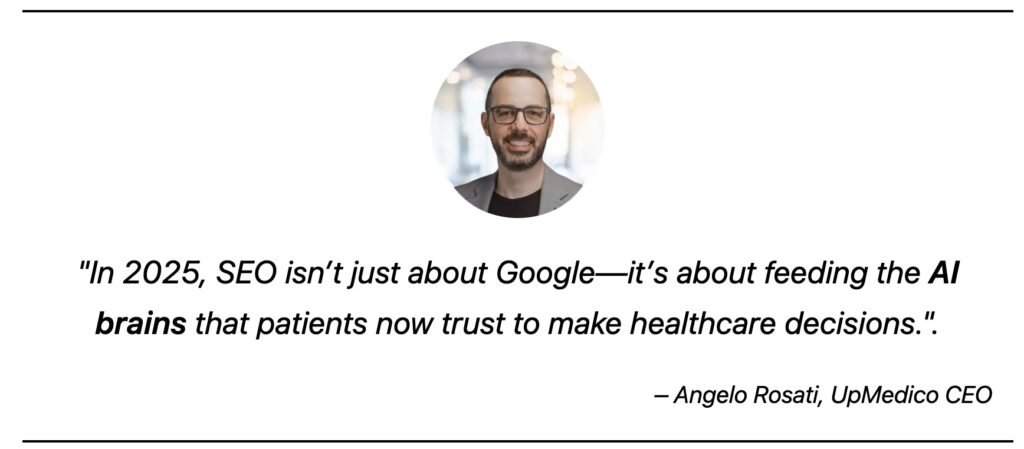A no-fluff, friendly guide to future-proofing your patient acquisition strategy in the age of AI search.
Hi Director—Let’s Talk About Bookings, Not Just Clicks
If you’re running a clinic and wondering whether to double down on Google Ads or invest in SEO, you’re not alone.
Here’s what we’re hearing from clinic directors in 2025:
“Our ad costs keep going up—why aren’t we getting more patients?”
“We’re creating content… but nothing’s ranking.”
“Google’s new AI Overview answers everything before people even see our site.”
The truth? Search has changed. Google Ads still works—but it’s more competitive. SEO still matters—but only if done with the right structure. And now, Google’s AI-powered results are taking center stage.
Let’s break it all down so you can decide what’s best for your clinic right now.
⚠️ Old Habits That Quietly Kill Growth
Let’s start with what not to do in 2025:
- Running the same ad campaigns from last year without updating your landing pages
- Writing blogs and praying for Google to notice
- Hiring an agency that sends you 12-page reports but can’t explain what’s actually driving appointments
If your traffic’s up but bookings aren’t, it’s time to change the playbook.
🆚 Google Ads vs. SEO: What’s the Real Difference?
| Feature | Google Ads | Google SEO |
|---|---|---|
| 📍 Where You Show Up | Top of search (labeled “Ad”) | Below ads—or in AI Overviews if optimized |
| 💰 Cost | Pay-per-click | Free traffic, but time/investment required |
| ⚡ Speed | Instant results | Slower start, compounding returns |
| 🎯 Control | Total targeting control | Less control—depends on Google + AI signals |
| 📊 Clarity | Highly trackable (CPC, ROAS, calls) | Requires setup, but can now be tracked to conversion |
| 🤖 AI Impact | AI Overviews can steal attention above ads | Big opportunity—AI favors structured, expert content |
Both channels can win. But they work very differently—and they’re stronger when used together.
“In 2025, SEO isn’t just about Google—it’s about feeding the AI brains that patients now trust to make healthcare decisions.” – Angelo Rosati, UpMedico CEO

🚀 Why Google Ads Is Still Incredibly Powerful
Paid search isn’t going anywhere. In fact, it’s smarter than ever.
Full Control
You choose:
- Who sees your ads
- Which services you promote
- When your ads appear
- Where they click
Need to push weekend appointments or test a new service line? Just turn on a campaign.
Built for Fast Testing
Want to try different messages for your physio clinic?
Google Ads lets you test:
- Multiple headlines
- Location-specific offers
- Different call-to-action phrases
And see which gets bookings.
It’s your digital lab for learning what actually converts.
Results You Can Measure
You’ll know:
- How much each lead costs
- Which services are driving revenue
- What time of day or keyword performs best
It’s data you can act on—this week, not next quarter.
🌱 Why SEO Matters More Than Ever in 2025
SEO used to feel slow and vague. But not anymore. In 2025, SEO is structured, measurable, and essential—especially for AI-powered results.
✅ AI Trusts Structured, Expert Pages
Google’s AI Overviews and other tools like ChatGPT are now the “first opinion” for many patients. To show up, your content needs to be:
- Machine-readable (using schema markup)
- Credible (clear expertise + patient trust)
- Well-structured (easy to summarize)
If you’re not optimized for AI search, your clinic may be invisible—even if your website looks great.
💡 Think of SEO Pages as Landing Pages for Free
Done right, SEO pages bring in traffic without paying for every click.
But they can’t just be pretty. They need to:
- Match real search intent
- Load fast
- Answer patient questions clearly
- Invite action (“Book your consultation”)
🔍 Your 2025 SEO Checklist: What Every Clinic Website Needs
Here’s how to make SEO a performance channel—not a black hole.
1. Technical Foundation
- ✅ Make sure your site is crawlable (no blocked pages, broken links)
- ✅ Submit an XML sitemap to Google Search Console
- ✅ Fix duplicate content and 404 errors
- ✅ Ensure all key pages (like services) are indexed
2. Page Speed & Core Web Vitals
- ✅ Load time under 3 seconds
- ✅ Mobile-friendly layout
- ✅ Compress images and lazy-load below-the-fold content
- ✅ Use server-side caching (especially for WordPress)
Use tools like PageSpeed Insights to track this.
3. Structured Data (Schema Markup)
Add the right schema types to your key pages:
- 🩺
MedicalCondition– clearly shows what you treat - 👨⚕️
Physician– adds trust and credentials - 🧾
FAQPage– helps win rich answers - 📍
LocalBusiness– powers map results and Google Business Profile - 🏥
OrganizationandWebSite– boosts brand understanding
Use Google’s Rich Results Test to validate your markup.
4. Intent-Matched Content
Each service needs its own focused page:
- Use patient-first headlines (“Tired of back pain? See a specialist this week”)
- Add trust signals (star ratings, clinic accreditations)
- Include a clear, visible booking CTA
Avoid “all-services-on-one-page” layouts. They confuse patients—and Google.
5. Internal Linking + Clear Navigation
- Link from your homepage to your top services
- Use anchor text that matches search terms (“sports injury physio,” not “click here”)
- Create related FAQs or blog content that links back to service pages
6. Set Up Tracking (Don’t Skip This!)
- Set up Google Analytics 4 with conversion events for:
- Appointment bookings
- Phone calls
- Contact forms
- Use Search Console to monitor keyword rankings and indexed pages
- Add Looker Studio dashboards to view performance at a glance
🤝 Smart Ways to Use Both Channels Together
Google Ads and SEO aren’t rivals—they’re partners. Here’s how to make them work together.
1. Use Ads to Test, SEO to Scale
Test messaging and keywords in Google Ads
→ Track what converts
→ Build SEO pages around proven topics
This saves time—and gives you compounding returns from what already works.
2. Build SEO Pages Like Ad Landing Pages
- Strong patient-first headline
- Benefits listed as bullets
- Booking CTA above the fold
- Video or written testimonials
- FAQ section with schema
Your SEO pages should feel like a natural extension of your ad experience.
3. Use Data Across Channels
- Pull top-converting search terms from ads into SEO
- Use structured content to lower bounce rates (and improve ad Quality Score!)
- Track patient journeys from ad click → SEO visit → booked appointment
🧩 Tools Every Clinic Should Use in 2025
| Tool | What It Does | Why It Matters |
|---|---|---|
| Google Search Console | Tracks indexed pages + rankings | Helps you improve visibility |
| Google Analytics GA4 | Tracks bookings + behavior | View SEO and Ads in one place |
| PageSpeed Insights | Tests site speed + Core Web Vitals | Faster pages = better results |
| Screaming Frog or Ahrefs | SEO audit tools | Spot broken links, duplicate content, etc. |
| Schema Markup Validator | Tests structured data | Ensures AI can read your site correctly |
🏆 So, Which One Wins?
| Goal | Channel | Why |
|---|---|---|
| Immediate bookings | Google Ads | Fast, flexible, and trackable |
| Sustainable growth | Google SEO | Compounds over time—no click fees |
| Best of both worlds | Use both together | Share data, test fast, build trust over time |
👉 Final takeaway: Ads get you traffic. SEO earns trust. The combination builds a pipeline that lasts.
Final Thought: Build for How Patients Actually Search
Patients in 2025 don’t just visit your homepage. They:
- Ask Google AI a question
- Click on the top 2 links
- Tap an ad—if it looks trustworthy
- Scan the FAQ for answers
- Book within 60 seconds if it’s easy
If your clinic doesn’t show up clearly, fast, and confidently—you’re losing patients to the ones that do.
💡 Need help reviewing your SEO or Ads setup? I can send a free checklist, a service-page template, or even walk you through your current site.
Just ask.
❓ FAQ: Quick Wins for Curious Directors
Should I choose Ads or SEO?
Both—if you want short-term bookings and long-term growth. Ads drive fast results; SEO scales over time.
Is SEO still worth it with AI search?
More than ever. AI-powered search highlights structured, trustworthy pages. Clinics with the right setup get free visibility.
How long does SEO take to work?
With the right setup? 6–12 weeks to see traction. But unlike Ads, SEO keeps growing without additional spend.
Can I use AI tools to create SEO content?
Yes—but have a clinician review it. AI is great for structure and speed, but medical accuracy and empathy are non-negotiable.






